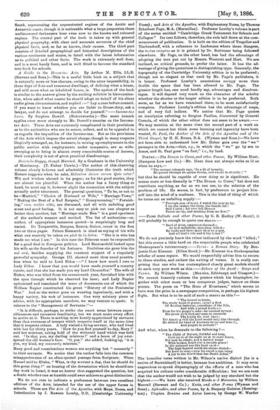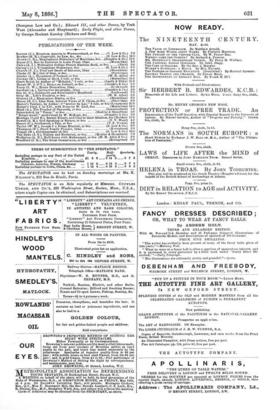POETRY.—The Dream to Come, and othm Poems. By William Hunt
(Sampson Low and Co.)—Mr. Hunt does not always write so ill as when he says,— " The coroner solemnly says, 'In a fit of insanity,
He passed through an opium dream, sad awoke in eternity ;' "
but that he should be capable of ever doing so is significant. He muses more or less dismally in "The Dream to Come," but does not contribute anything, as far as we can see, to the solution of the problem of life. He seems, in fact, by preference to project him-- self into the mind of a madman. This is the kind of thing of which he turns out an unfailing supply :— " Throngh seas of tears, I watch the year go by, I see the snakes, the trees, the lizards die Still I exist ; for ever fell Disease
Passes me by, and mocking from me flees."
From Ballads and other Poems, by G. R. Hedley (W. Scott), it will probably be enough to quote one stanza :—
" Bard of Avon, empyrean-throned-
As hal k melodious, man-king willed— By rooks and claws must thou he zoned. And all that's vile and fl.thy b Iled ?"
We do not precisely know the crime indicated by the word " billed; r but this seems a little hard on the respectable people who celebrated Shakespeare's tercentenary.—Verus : a Roman Story. By Ben- jamin Gott Kinnear. (Elliot Stock.)—Mr. Kinnear is a Shakespearian scholar of some repute. We would respectfully advise him to return to those studies, and eschew the writing of verses. It is really sur- prising that one who has contemplated closely great models should do such very poor work as this.—Echoes of the Anvil : Songs and Poems. By William Wilson. (Menzies, Edinburgh and Glasgow.)— We cannot honestly endorse the praises which his biographer, to- gether with other more or less competent judges, bestow on these poems. The poem on "The Hero of Khartoum," which seems to have won the prize in a newspaper competition, is perhaps his highest flight. But what is to be said of such a stanza as this P — " The invent've brain,
The ready hand of genius, 'Rigel a fleet Of floating batteries, guardians of the Nile,
And with a proud &edam—
Even for his people's sake—he scorned retreat: His peace with God and man to reconcile The lonely Gee eral toot; Yet trustiog still the Lord would help him through,
He drilled his band of warriors brave and true Oh
And prayed in solitude
And what, when he descends to the following P-
" The Child of Nature, faithful and tree, Cold chiils of the night no m re shall brave, For now he sleeps, and a mother weeps With broken heart o'er a humble grave I In lite unheard was the local hard— The high-headed world his claims denied— But born to sing,—now his sweet songs bring A joy to the world that has Death defied."
The homelier verse written in Mr. Wilson's native dialect (he is a native of Barntisland) is better, because less ambitions. It may seem ungracious to speak disparagingly of the efforts of a men who ha acquired his culture under considerable difficulties ; but we are sure that the author would not wish to be judged by any standard but the highest.—We have also received Moods a, d Memories, by William Maccall (Stewart and Co.) ; Katie, end other P, ems (Wyman and Sons); Aphrodite, and other Poems, by A. Step:ley Gulston (Reming- ton) ; Utopian Dreams and Lotus Leaves, by George W. Warder
(Sampson Low and Co.) ; Edward III., and other Poems, by York West (Alexander and Sbepbeard) ; Early Plight, and other Poems, by George Herbert Bergey (Bickers and Son).















































 Previous page
Previous page